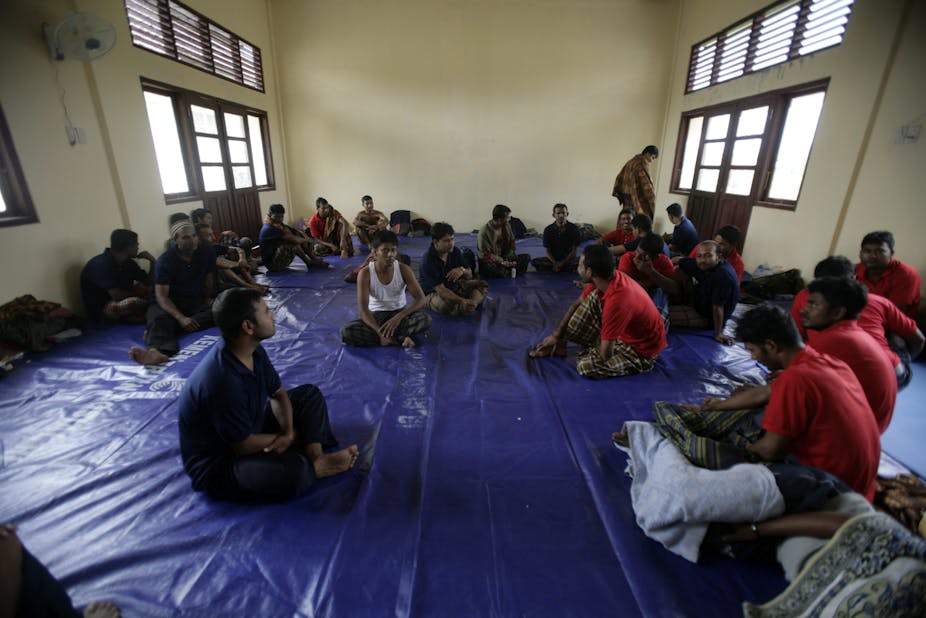Immigration Minister Scott Morrison has announced that asylum seekers residing in Indonesia while awaiting protection will no longer obtain resettlement in Australia. This move puts into serious question the humanitarian rationale for Australia’s resettlement program and its work on a Regional Co-operation Framework for asylum seekers in Southeast Asia.
Government officials constantly refer to Australia’s resettlement program as the “proper”, “fair” and “orderly” way for asylum seekers to ask for Australia’s protection. The very existence of a resettlement “queue” is the central concept upon which Australia’s policy is based.
Successive Australian governments have also emphasised that resettlement ensures protection is given to those refugees who are most in need. They say boat arrivals are seeking to evade that “queue” and are taking protection places away from “genuine” refugees waiting in overseas camps.
Morrison’s announcement on Tuesday is therefore very puzzling. He said that asylum seekers who registered with the United Nations High Commissioner for Refugees (UNHCR) in Indonesia on or after July 1, 2014, will no longer be eligible for resettlement in Australia. The policy change has been justified by reference to people smuggling. Morrison said that the changes:
… should reduce the movement of asylum seekers to Indonesia and encourage them to seek resettlement in or from countries of first asylum.
However, there is no obligation on asylum seekers to seek resettlement in or from countries of first asylum. For example, there is no obligation on an Iraqi refugee to seek resettlement from Iran.
In terms of international law, it should be noted that resettlement is a discretionary act by states. There is no treaty obligation on Australia to provide resettlement. Because of this, Australia’s move to ban resettlement for those waiting in Indonesia is not contrary to the UN Refugee Convention.
Yet it is contrary to international practice of other states and the position of the UNHCR. No other country in the world requires asylum seekers to seek resettlement from the first country they are able to reach. No other country bans such people from obtaining resettlement. The UNHCR also does not require asylum seekers to apply for resettlement only near the place of the originating conflict or persecution.
There are very good reasons for this. In some cases, it may be dangerous for some people to stay in a country near their country of origin. For example, it may be dangerous for Afghan asylum seekers to stay in Pakistan because the Taliban or pro-Taliban forces still have influence in some areas there. This is relevant, as many Afghan asylum seekers are residing temporarily in Indonesia as they await resettlement.
There is also an important aspect of resettlement that must be borne in mind when assessing the government’s announcement. When Australia gives someone a resettlement visa, it selects persons who have been referred to it by the UNHCR. Because of this, the Australian government is supposed to be guided by the priorities set by the UNHCR, in addition to its own domestic priorities.
When deciding who needs resettlement, the UNHCR focuses on the need of persons for protection. It prioritises those persons who are at risk of return to their home country, arbitrary detention or persecution.
The UNHCR also prioritises particularly vulnerable refugees with needs that cannot be met in the asylum country. These include survivors of torture and violence, people with serious medical issues, women and girls, and some children and adolescents.
Australia’s criteria for resettlement decisions are slightly different. It looks to both “regional and global priorities” for the settlement of persons on “humanitarian grounds”. It is highly questionable whether banning the resettlement of refugees in Indonesia is in line with international priorities for resettlement or Australia’s regional priorities.
Australia’s regional priorities in asylum seeker policy have clearly been directed at border control. However, there is also an emphasis on burden-sharing. Australia has been one of the main leaders in the creation of the Regional Co-operation Framework agreed at the Bali Process in 2011. One of the ideas this emphasises is orderly migration pathways and resettlement both within and outside the region.
If Australia does wish to establish a wider regional framework between countries in Southeast Asia, a ban on resettling asylum seekers from Indonesia, one of Australia’s most important regional asylum partners, seems contrary to this.
However, it may well be that the Indonesian government supports Australia’s ban on resettlement. It is highly likely that Indonesia does not want large flows of asylum seekers coming to it from source countries like Iraq and Afghanistan. It is possible that the numbers coming to Indonesia will be minimised after this announcement. If this is so, resettlement will no longer be a way to give refugees protection, but a way of placating our nearest neighbour.
Whatever the motivation for Morrison’s announcement, it illustrates that resettlement is not a purely humanitarian measure. It is also a program that allows states to select refugees based on political factors such as foreign policy and electoral interests.
As a result, this announcement calls into question the rationale of the resettlement program as one that gives a place to those most in need of protection. Instead, resettlement may be increasingly used as a tool for foreign policy, border control and domestic political interests.
If so, Australia can no longer justify its policy as a reflection of fairness and humanitarianism.

